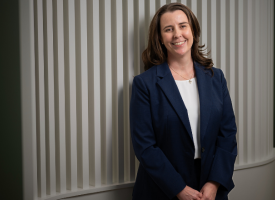AMA President Dr Omar Khorshid on Weekend Sunrise
Transcript: AMA President, Dr Omar Khorshid, Outlet: Weekend Sunrise, Saturday, 28 May 2022
Subject: Public hospital crisis, federal and state government funding formula
MATT DORAN: Dr Omar Khorshid is the national president of the Australian Medical Association and Kylie Ward is chief executive of the Australian College of Nursing. Very good morning to you both. Dr Khorshid, I think sometimes we gloss over numbers and statistics, but I think this one warrants, sort of, bearing down on. 4732 more deaths compared against the average for a couple of months over January and February. What on earth has caused that? Is that the pressure on the system currently?
OMAR KHORSHID: Well, you've always got to be careful when you look at stats. But there's no doubt that it is yet another statistic to add to the ambulance ramping and all the other evidence of the extraordinary pressure on our system. Some of it will be clearly COVID. Some of it may be COVID causing extra demands on the health system and the health system simply not being able to cope. And people who present to hospital with conditions that really should be treatable are having their treatment delayed. And of course, unfortunately, when you step back and look at a figure like a death rate over a period of a month, we're now seeing a spike before we even really hit winter.
MATT DORAN: Kylie, Omar Khorshid just mentioned the ambulance ramping issue, which is which is a big one and I think reflects the fatigue on nurses and the strain on the system more broadly. In New South Wales today we're seeing paramedics striking, ambulances refusing to go outside of their area. What's your view on how we fix this problem?
KYLIE WARD: Well, in New South Wales and around the country you've got emergency departments with dozens. One particular has 20 vacancies of nurses and they're turning out with such limited numbers of colleagues to work with. So last year I predicted a nursing crisis and I would call the new Minister for Health to come and talk to us about addressing that urgently.
MATT DORAN: The problem is you don't have a new minister for health at the moment, do we? I mean, we've got Katy Gallagher as the interim minister. We're hoping to have a health minister by Wednesday. Do you find it, as I do, staggering that given the crisis at the moment facing this health system, that we don't have a minister yet?
KYLIE WARD: I am concerned that we don't have anyone to work with. But Mark Butler and I spent time together pre pre-election. So I'm very confident, and Katy, whoever is sworn in, they need to straightaway talk to the Australian College of Nursing and the nursing profession. There is no health without nurses. Nurses represent the best vanity and if we don't do something to look after them, there won't be any care to be delivered.
MATT DORAN: Well, that's right, because the nurses at the moment, as I understand, have been working for two years at least and are now being denied annual leave requests. Certainly, they're at breaking point. Dr Khorshid, looking at this situation more broadly, as you have the luxury of doing, from a national perspective, what do we need in terms of resources? What does the new government need to do to build a better system, now that we look at what's happened with COVID and we've got a chance to rethink the entire thing?
OMAR KHORSHID: Well, the very first thing we've got to do, Matt, is to stop the blame game, stop this perpetual issue where each level of government blames each other for the problems that are so clearly visible. So, having a Federal Government actually accept its responsibility for our national health system, for the fact that all parts of the system are all interlinked, and they're broken at the moment. That would be a great start. But then, of course, we need to work very quickly on what do we need to do about COVID, because clearly the pandemic is not over. How do we act fast to address some of the critical issues at the front door of the hospital in emergency departments? And of course, the fact that Australians cannot access elective surgery. But then the new government has got to sit down with the states and work out how do we fund a new health system and how do we start the reform conversation around the broader system, to make sure that next year we're not talking yet again about the continually worsening health crisis?
MATT DORAN: Kylie, can I ask you: can you take me and take Australians inside the traditional shift, now, for an exhausted, depleted, shattered nurse? I mean, how difficult is it for them? Can you give us any insights into case studies or examples of the toll this is taking?
KYLIE WARD: I could sit down for a day, a minute or an hour and tell you the stories. The challenge is that nurses are a 400,000 strong workforce, we're the most geographically dispersed, so nurses will be caring for people where they live: in the hospitals, in the aged care facilities and in the community. So every day looks a bit different, but wherever a nurse is working, they're completely stretched, and my colleague Dr Clare Skinner has said it best: Medicare is completely outdated, it's a last century model that doesn't honour nurses. So nurses in the community and nurse practitioners cannot get access to payment, and that is crazy in and of itself. And we'd be able to keep people out of hospital if we could support nurses in all areas, including regional and rural Australia.
MATT DORAN: And is it enough to replace these exhausted nurses with junior nurses coming up and coming through?
KYLIE WARD: It's actually incredibly unfair to think that- we have seen, or we've heard, that mid-career and very senior nurses have had enough and have walked. [Audio skips] might be working in vaccination hubs or different places, but they're certainly depleted in many of the
hospitals, and a lot of wards can't open as a result. And it's completely unfair and unreasonable to think that early career and new graduate nurses could staff and support the patients that we serve. You wouldn't have a new graduate lawyer going in and defending somebody in court, and why should we do that to our early career workforce? And all clinicians have been stretched, but nurses cover the sector 24/7 and our colleagues rely on us. So we really need to think about that skill and skill mix and how we support them.
MATT DORAN: Well, it's a reflection of the strain on the system. Dr Omar Khorshid and Kylie Ward, you do a great job representing your workforces. Thank you very much for being with us this morning.
OMAR KHORSHID: It's been a pleasure, thank you.
KYLIE WARD: Thanks Matt.



